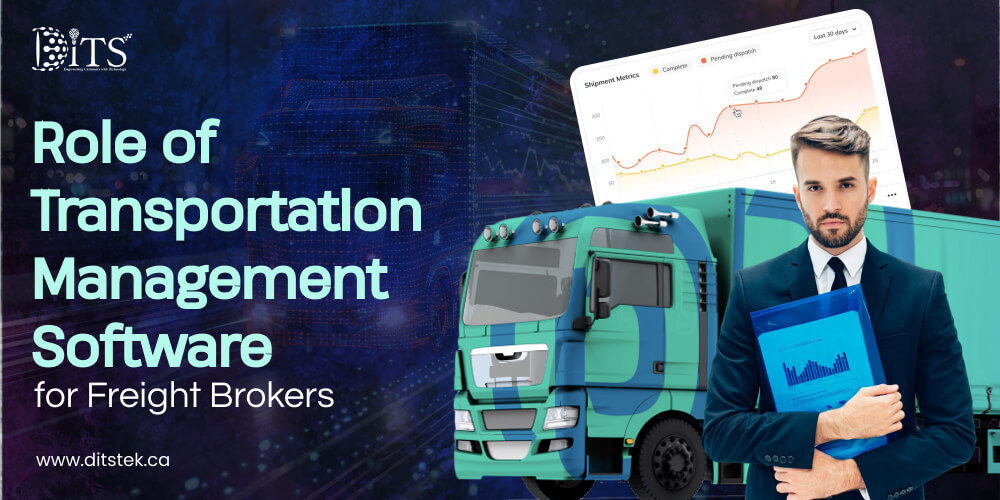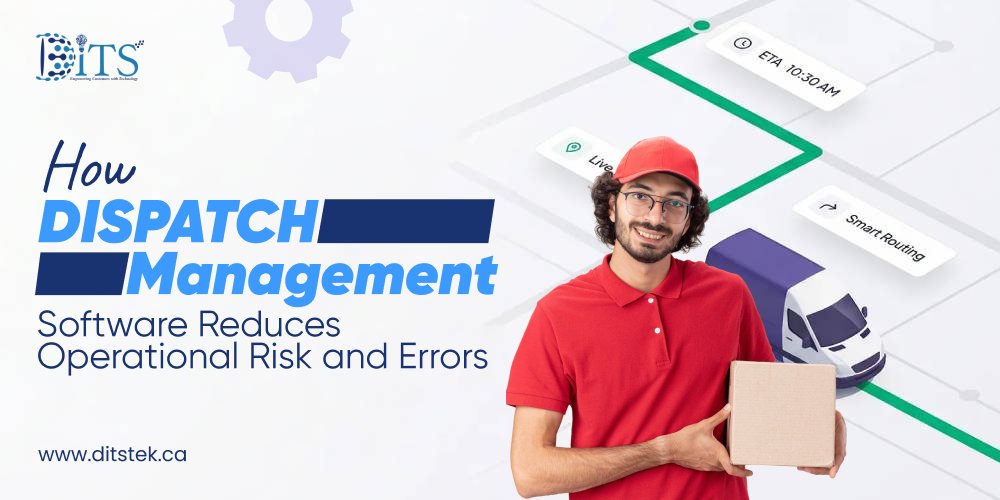Role of Transportation Management Software for Freight Brokers
Table Of Content
Published Date :
23 Oct 2025
Freight brokers play an essential role in Canada's transport sector. They handle the transportation of goods by identifying the most efficient, least costly routes, creating a win-win for the customer and the company. TMS (Transportation Management Systems) helps brokers to the point where they can even assign the proper transportation company to every shipment and ensure that the paperwork is completed correctly and on time.
TMS systems connect every part of the supply chain, so that the company can quickly and effectively satisfy customer orders and meet market demand. A freight broker's day-to-day operations can be made more efficient by implementing transportation management software that provides transparent service, extensive connections, and strong communication.
This blog shares the role of a transportation management system (TMS) in freight operations. It will also explain the challenges Canadian businesses face, and benefits of using a TMS for the movement of goods from one place to another.
The Role of TMS in Freight Brokerage Operations
Running a freight brokerage means balancing a hundred things at once: finding carriers, matching loads, tracking shipments, keeping clients informed, and managing paperwork that never seems to end. That's precisely why transportation management software for brokers has become such an essential tool. It helps them stay organized, responsive, and efficient, even when operations scale up.
Billing also becomes more manageable. The software automatically generates invoices, organizes proof-of-delivery invoices, and flags any missing documents, allowing the broker to act before payment delays occur. It means less manual work and fewer errors.
What's more, these systems come stock with detailed reporting options and analytics. Brokers will know which carrier performed best, how much each route costs, and which clients are responsible for the most profit. With that knowledge, brokers can make informed decisions rather than guesswork.
Is Your Freight Operation Built for Growth?
The right Transportation Management Software for brokers can remove bottlenecks, improve visibility, and scale with demand.
Key Benefits of TMS for Canadian Freight Brokers
Canada's freight industry operates on tight schedules and over long distances. For brokers trying to manage it all, transportation management software becomes more than just a tool; it's a daily advantage. Here's how it helps them stay ahead in a fast-moving market.
Saves Time in Daily Operations
What used to take hours now only takes minutes. Load bookings, rate confirmations, and shipment updates are completed automatically. TMS allows brokers to get back to customers much faster, securing more loads. Everything continues to move fast and smoothly, even in peak season.
Improved Accuracy and Less Paperwork
Manual errors have significant costs in money and time. With TMS, every quote, invoice, and delivery record is stored in one place. The software auto-fills missing information and shows any inconsistencies before they become bigger problems. It keeps things tidy and organized.
True Real-Time Visibility
Knowing exactly where every shipment is; that is true peace of mind. The broker can use real-time access to track loads across provinces and borders. When delays or reroutes happen, updates are hassle-free and instantaneous. The client is up-to-date, and the broker still has control without constant follow-up.
Facilitates Efficient Cost Management
Expenses such as fuel costs, route changes, and carrier rates can quickly eat into a company’s profits. With analytics and route optimization, brokers can easily compare carriers, tweak pricing, and schedule trips to save time and money, while the software highlights savings opportunities when they are hiding.
Builds Client Satisfaction
Brokers build trust with transparent communication and on-time deliveries. A TMS ensures brokers can provide precise updates, keep promised delivery timelines, and report to clients efficiently. Quality service can be developed into a reliable partnership.
Grows With Increased Business
As brokers onboard additional clients or increase volume, their systems must be scalable. Transportation management software can grow with brokers, adding users, automations, and integrations without disruption. It is a system that can support expansion without requiring an entirely new platform.
Challenges Freight Brokers Face Without a TMS
Running a freight brokerage without software for transportation management is very similar to trying to run a highway with no traffic lights; things move, but they may not be moving in the right direction. Even today, many brokers in Canada rely on spreadsheets, phone calls, and emails to manage shipments, leading to delays, missed updates, and unnecessary stress.
Without proper digital systems like TMS, even minor errors in scheduling or vehicle tracking can lead to missed deliveries and higher costs. A transport management or fleet management system reduces operating costs and ensures timely deliveries of goods.
Challenges With Manually Managing Shipments
If there is no system in place, brokers end up spending too much time managing shipments on their end. Every rate check, carrier update, and delivery confirmation becomes its own task. This slows down operations and provides even more room for errors, which could lead to very significant costs later.
Lack of Visibility to Shipments
The chaos of not knowing where a shipment is headed can be overwhelming. Delays can blindside brokers and leave customers waiting for updates. Without tools for tracking shipments, monitoring the process for many loads becomes even more challenging, especially during peak times.
Billing Errors and Documentation Issues
Paperwork is a huge challenge. Missing paperwork, duplicate invoices, or wrong rates can lead to disputes before the shipper even submits a payment to the broker. The many minor errors that happen casually without automation add up, affecting cash flow or client relationships over time.
Imprecise Communication Between Teams and Partners
When employees resort to phone calls or lengthy email threads, confusion arises. Information falls through the cracks, updates take longer, and the same question is asked multiple times. This only slows the entire operation down over time and makes it less reliable.
Dispersed Data for Reporting and Analysis
When data resides across documents or email inboxes, it's hard to make informed decisions. Brokers are unable to analyze carrier performance or identify savings opportunities accurately. This is especially important when planning potential long-term improvements to the business.
Struggles With Scalability
As the organization grows, manual processes start to fall apart. Managing dozens of shipments may seem manageable, but when it comes to hundreds of shipments with no automation, human errors happen, employees burn out, and customers stop calling back. The inability to scale the operation means business growth will come to a standstill.
If you are facing these challenges, our guide to transportation management software can help you understand how the right system transforms freight operations from the ground up.
Want Better Communication Across Your Network?
Integrate dispatchers, carriers, and clients into one digital system for seamless coordination and faster turnaround.
How to Choose the Right Transportation Management System for Business
Choosing the appropriate option depends on a company’s operations, budget, and future goals. The question is not about selecting the right software, but about building a solution that will continue to grow with a business and naturally integrate into the workflow.
Here are some essential factors to consider:
Scalability
Consider where a business is expected to go in several years. A good TMS will scale as the shipment volumes grow, route volumes grow, or shipping processes are added. The right TMS must scale with changing needs, without slowing the business down.
In short, scalability is the software's ability to absorb growth without major interruptions; more orders, more partners, more complexity, while still allowing for scaling.
Integration
A TMS should never operate on its own. It should communicate with all existing systems, whether they are an ERP, CRM, or Warehouse Management Platform. Good integration ensures that data can be exchanged continuously and in real time between departments and locations, eliminating errors and reducing repetitive work within operations.
The TMS should also be able to integrate with carriers and logistics partners so it can provide real-time updates, automate shipment planning, and enable fast communication. When the systems communicate, the operations will spend less time correcting "bad data" and reworking it into reality and more time moving freight.
Ease of Use
Even the best TMS is worthless if it is hard for a team to work in. The system should be intuitive and straightforward, not something employees have to read a manual for or spend weeks training on. Look for clean dashboards, seamless navigation, and customizable workflows that align with how the business actually operates.
An easy-to-use system allows teams to plan routes, track shipments, analyze performance, and more, with minimal friction. When software is easy to use, productivity increases, mistakes decrease, and customer satisfaction improves as a by-product.
Price
Smart spending doesn't always mean spending large amounts of money. When looking for a transportation management system, pay attention to the upfront costs and costs thereafter; subscription costs, installation costs, training, future upgrades, etc. Look for a balance between price and value.
Business owners should ask themselves: Does the system help save time? Does it help reduce paperwork and manual efforts? Will it grow with the business with no hidden costs? The right TMS will deliver a return on investment in efficiency, accuracy, and future growth.
How DITS Helps Businesses Build Transportation Management Solutions
At DITS, we specialize in designing transport management software that adapts to each customer's business processes. Every freight brokerage, carrier, or logistics company we work with has its own challenges, goals, and ways of working. We customize technology that supports them.
We work to understand freight operations, routes, loads, teams, and client interactions. Then we build systems that simplify the hard parts: carrier management, shipment tracking, invoicing, and load scheduling. Whether working province-to-province or managing cross-border shipments, our solutions are built to adapt.
We can also plug the fleet management tools directly into the platform. The solution can provide visibility into driver performance, maintenance management, delivery schedules, and more in one system, without manual invoicing.
Another part of our plan to innovate is AI. We can use artificial intelligence technology to help with development, testing, and QA, which all make each build cleaner, faster, and more adaptable. And we can use AI to adapt features to each client's needs and workflow, without sacrificing reliability or problem-solving capabilities.
We also integrate intelligent features such as AI chatbot solutions to simplify user interactions and provide instant support for drivers, dispatchers, and clients.
Planning to Upgrade Your Freight Technology?
Our development team builds scalable, integrated TMS solutions designed for modern Canadian freight operations.
Conclusion
The freight market in Canada is growing rapidly. Customers want real-time updates, on-time delivery, and predictable costs. Freight brokers managing multiple carriers and shipments have quietly used transportation management software as the engine of efficiency. It removes day-to-day chaos, provides structure, and gives brokers visibility and control over vehicles’ motion, their location, and their performance.
In a country where supply chains can stretch thousands of kilometers, the distinction between on-time and too late can depend on how well-built your systems are. That's why companies are considering tools that bring visibility, automation, and smart analytics into one application.
At DITS, we support companies in designing and developing platforms that support their operations, simple to use, whilst powerful enough to manage complex operations. Because the right system doesn't just move shipments, it moves your business forward.
FAQs
1. What does transportation management software do for freight brokers?
Transportation management software offers freight brokers a way to plan, monitor, and execute freight operations in one location, automating daily routine tasks from load matching, rate management, tracking shipments in transit, and billing. They can view every aspect of shipping visually and improve visibility across your entire operation.
2. Why should a freight broker in Canada invest in a TMS?
A TMS saves time, reduces manual errors, and improves the tracking of shipments with real-time, viewable tracking of shipments across Canadian long-hauls. It also enhances a broker's ability to make fast, data-driven decisions and provides better customer service by offering automated tracking updates.
3. Is custom transportation management software better than off-the-shelf solutions?
Yes, because custom TMSs are built to match the brokerage's workflow, their integrations, and regional territory needs. Unlike an off-the-shelf platform, a custom TMS is made to scale with the company and simplifies multiple processes, reducing complexity.
4. How does AI improve transportation management systems?
AI enhances TMS by automating tasks, improving accuracy, and providing predictive capabilities to identify shipment opportunities. We use AI on software development at DITS as a part of quality checks and of custom programming for customer TMS, which provides a faster, more innovative, and more reliable TMS.
5. Can a TMS integrate with my existing fleet or accounting systems?
Absolutely, a well-designed TMS will integrate with fleet management systems, ERP, and accounting systems, ensuring that all your data and routes flow into the system each time without duplication or additional effort.

Dinesh Thakur
21+ years of IT software development experience in different domains like Business Automation, Healthcare, Retail, Workflow automation, Transportation and logistics, Compliance, Risk Mitigation, POS, etc. Hands-on experience in dealing with overseas clients and providing them with an apt solution to their business needs.
Recent Posts

Digital transformation in healthcare streamlines operations, reduces administrative waste, strengthens revenue cycles, and enables data-driven decisions that support sustainable cost control and improved care delivery.

Reduce operational risks and errors by replacing manual, spreadsheet-based processes with dispatch management software.

Discover how bespoke MVP development services help Canadian companies reduce product risk, validate ideas faster, and build scalable products with confidence.